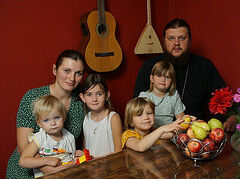—I saw your beautiful, sincere post on social media—greetings to your wife on her birthday. How do you celebrate holidays? What traditions do you have?
—Over the past two years the following tradition has been formed: For the birthdays of our family members, our daughters cook a cake. They usually take Yubileinoye (“Jubilee”) biscuits, grind them, make a whipped cream, add different toppings and always invent something new. Our daughters banish my wife and me from the kitchen at that moment, saying: “Don’t look! Don’t come in here!”
One of our most important traditions of spending time with children is board games. A few years ago, we discovered that there are board games that adults and teenagers can play together. Games are often perceived as something exclusively for children, but there are wonderful options (for example, the Imaginarium, Gnome Pests, Alias), which allow adults and teenagers to play. If you play with very young children, you have to play at their level and in their favor.
We often invite about ten relatives (we love a lot of company). We abstain from alcohol at home. My wife and I made such a decision ten years ago: I help alcoholics, which means that we ourselves must set a good example. We have a meal with our guests, clear the table, play board games for two or three hours, and then drink tea with cake. We often sing songs: folk songs, Cossack songs, and modern ones. Everyone in our family has a musical education and singing experience (my wife used to sing in the church choir, I sang in the seminary men’s choir, and the children attend music school).
We also like to get out into nature for picnics, to make a fire, and not necessarily to a well-tended, familiar place. Our children love to relax with their parents—no one forces them to go. When they get tired of their friends, they say, “Let’s go together! Only our small group.”
 —If a couple who lives together but hesitate to get married comes to you, what do you advise them?
—If a couple who lives together but hesitate to get married comes to you, what do you advise them?
—This is a topic for a separate conversation. Young people who decide to live this way usually do not seek a priest’s advice. But sometimes they do. I usually say: “You take responsibility before each other, before society and before God if you are believers. Even if you are not church-goers and nevertheless come to church with a question to the priest, you still take responsibility. This responsibility is not only emotional and spiritual—it should also be legal and financial.” Sometimes people who live together as an unmarried couple for five to ten years and already have children, say, “Why do we need it? Why should we officially become spouses?” Problems arise when one of them dies and the other has no legal rights. Through the court they will have to prove that there is jointly acquired property, and this is also a troublesome and time-consuming thing. If a man refuses to enter into marriage, he leaves his close ones vulnerable. Most often men are the initiators of cohabitation, but women can also.
—As a rule, the main argument in favor of cohabitation is the following: “Let’s wait and see. We won’t have children for the time being.”
—If we are talking about a couple who are married and want to postpone having children for some serious reason, this is understandable. There are situations when a girl needs to finish her education, write and defend a thesis, or a guy has to go on a business trip for a year or two. Clearly, it will be hard for a young mother to cope alone with a baby. We have the Fundamentals of the Social Conception of the Russian Orthodox Church, which say that in case of serious reasons spouses can use means of non-abortive contraception. (And if there are health problems, then there are no questions at all). A young family can wait a year or two before having children so that later they can devote their time and energy to them. I emphasize that we are not talking about selfishness: “It’s not time for us to have children now because first we want to vacation at warm seas, travel across countries and continents and buy a new car.” No, I mean serious, valid reasons.
But when they do not want to marry and have children, although they live together, and this lasts for years, I always ask: “If you truly love each other, then what are you afraid of? What are you waiting for? Today you talk about eternal love for each other and look into each other’s eyes, but leave the door ajar behind your back.”
Perhaps they are afraid of responsibility, of a serious relationship and want an easy life in order not to strain themselves... I can give an example: A person does not buy a car, but leases one for a while. He drove a BMW for a month, then he took a Mercedes, then a car of some other make. He looks at which car is better and then chooses, because buying is responsibility—he has to maintain it and pay a loan, whereas leasing does not oblige him to do anything. Once the lease term has expired, he gives the car back. It is the same with cohabitation: Two people “lease” each other, living without obligations. He expects that he may meet another one who will be more interesting; she thinks that she will meet someone who will be richer and more gallant. And their relationship is terminated: “That’s it. I’m leaving you!” Is it love? No, this is consumerism. People just use each other.
—Priests concerned over cohabitation often try to get through to girls (sometimes in a harsh tone) that they should not follow the fashion or indulge the whims of guys...
 —I agree with this, although it is better to express your idea delicately and with love. The problem is that if a young woman allows herself to be treated this way, the man will not respect her and will treat her as a “temporary option.” She hopes that he will marry her at some point. In our country, according to statistics, there are about six million more married women than married men. Funny enough, cohabiting women consider themselves “married” and tick this box in questionnaires and surveys. At the same time, men tick “single” here. Such a man has a woman and maybe children with her, but he is not legally married—the marriage is not registered. Women are in a vulnerable situation. If a partner leaves, who will be responsible for the upbringing of their children? Rarely do children live with their father—most often with their mother. Some men are even proud of this: “I have ten sons and daughters, albeit from five different women.” Not only is it un-Christian—it’s just not human.
—I agree with this, although it is better to express your idea delicately and with love. The problem is that if a young woman allows herself to be treated this way, the man will not respect her and will treat her as a “temporary option.” She hopes that he will marry her at some point. In our country, according to statistics, there are about six million more married women than married men. Funny enough, cohabiting women consider themselves “married” and tick this box in questionnaires and surveys. At the same time, men tick “single” here. Such a man has a woman and maybe children with her, but he is not legally married—the marriage is not registered. Women are in a vulnerable situation. If a partner leaves, who will be responsible for the upbringing of their children? Rarely do children live with their father—most often with their mother. Some men are even proud of this: “I have ten sons and daughters, albeit from five different women.” Not only is it un-Christian—it’s just not human.
—Clearly, every family is individual, and everyone has their problems and worries. Nevertheless, there are questions that are of interest to many. Who is the head of the family? What does it mean to be the head of a family?
—In the Gospel of Mark the disciples disputed among themselves, who should be the greatest. And the Lord replied: If any man desire to be first, the same shall be last of all, and servant of all (Mk. 9:34-35). The Savior set an example for us. We read how Christ washed the feet of His disciples before the Last Supper. It sounds so beautiful: He washed the feet of the disciples. Now imagine how it really looked—they were twelve robust men who walked barefoot or in sandals, so their feet did not smell like violets... It was a humiliating job, which was usually entrusted to the most junior servants.
The Lord shows us an example of service and love. Family is a place of service too. A place where you should sacrifice your interests for the sake of your neighbor. I believe that there is a certain bias in our culture. We often interpret these words in such a way that the woman should sacrifice her interests and desires for the sake of her family. But Apostle Paul notes that the woman is the weaker vessel that requires a special treatment. We know about this; medicine says that the female psyche is more mobile than the male. The male psyche is rougher and more straightforward. Where a woman becomes hysterical a man can react calmly. The fragile half of humanity has other talents—more sincerity, empathy and understanding of the subtle nuances of the psyche and behavior of children. For example, when the father uses the belt, the mother looks for a compromise or an explanation—a child could be tired, or a teenager may have personal problems.
Why am I saying all this? In my view, husbands should remember this commandment more often. Unfortunately, we have a big problem with this. Many say that the husband should be superior to the wife, quoting the words of Apostle Paul: The head of the woman is the man (1 Cor. 11:3). Okay, if you want to be the head, then take on a greater workload. If you want to show that you are the head of the family, that’s great—take on a greater responsibility. When you come home from work, instead of lying down on the sofa do the washing-up, peel the potatoes, hang up the laundry, take a walk with the children and tell your wife, “Lie down, have a rest or take a stroll alone for half an hour.” The wife should be given the opportunity to stay alone without children for a while, especially if they are small.
When discussing the contribution of each spouse to the family, we often forget that the amount of household work is enormous, although it’s imperceptible. Let’s see how much the work of a housekeeper, a housemaid costs: to cook, wash, iron, clean and so on. Her work will cost 50,000 to 70,000 rubles (720-1000 US dollars) a month. Why when a wife (who goes to work and takes care of the children) does the same thing, does it seem that she does nothing special? And the husband, the head of the family, comes from work, opens the Domostroy [a sixteenth-century detailed manual of the household management in Russia.—Trans.] and says: “You must obey me.” When I see such a sight, I can’t understand it. This situation is wrong.
It is no coincidence that we read during the Church wedding the words of Apostle Paul from the Epistle to the Ephesians (Eph. 5: 22-23). Wives, submit yourselves unto your own husbands, as unto the Lord. For the husband is the head of the wife, even as Christ is the head of the church: and he is the saviour of the body. These words are addressed not only to women, but also to men. The husband should be like Christ. The apostle says that Christ so loved the Church that He gave Himself for it. The husband has the right to expect, not demand! Namely, to expect respect, to hope for respect from his wife provided that he tries to behave like Christ and performs the labor of self-sacrifice. If he does not accomplish such a feat, all his claims are not worth a pin.
Speaking on this subject, we should look a little into history. The social role of women in the Middle East was to give birth to children, wash, clean, cook and serve. But suddenly in the Gospel we read that Mary of Bethany, Martha’s sister, sat at Christ’s feet and listened. Why is this moment so important? We remember that the Apostle Paul sat at Gamaliel’s feet. He was not just one of his disciples—he could sit at the feet of this well-respected teacher of the Law, he was his closest disciple. And the Lord Jesus Christ allowed Mary not just to stand at the door and listen, but allowed her to sit next to Him, at His feet. This shows that there is no difference in the spiritual sense between a man and a woman. There is a difference in social roles, talents and opportunities. Above all the angels, the saints, the righteous and the apostles we honor the Most Holy Theotokos. Therefore, it is wrong to take a quote from the Holy Scriptures out of context and say: “It follows from these words that she should be in a subordinate position and do exclusively household chores without receiving education or developing her skills at work.” This is manipulation.
There is also such a moment: It is known that insecure men are afraid of strong women. A woman who is well-educated, successful, self-confident and who has a high-paying job causes fear in such men. She cannot be manipulated—she is an independent person. Such a man cannot say outright: “I’m infantile, a big boy who just wants you to obey me.” He looks (sometimes consciously and sometimes unconsciously) for some pseudo-pious excuses in order to achieve his goal. From here manipulations begin: “You must!” and so on. I see the situation this way.
But if there is real love, then the opposite happens: The husband is only glad that his beloved woman realizes her talents, that she derives joy from life, that she is engaged in an interesting business that helps her develop and grow.
—Thank you very much for the talk! In conclusion, can you share some personal technique that helps you in family life?
—Five years ago, chess appeared in our kitchen. A small chessboard with magnetic pieces, which traveled with us on all pilgrimage trips and vacations. My Anechka and I play chess when we sit down for tea: we set out the chess pieces and start... At first, my wife often lost because she had never played before, while I have been playing since childhood. But then she gained experience and began to win. Now we can say that we play on an equal footing.
There can be tense situations in family relationships. Then one of us silently sets out the chess pieces and makes the first move. I may be the first to move my knight, and my wife, after looking with an offended gaze for a minute or two, makes her return move. The game goes on, and all disagreements are slowly forgotten. We have stakes—for example, the winner chooses a movie to watch together. For our family, this is a very successful and good discovery, which sometimes helps us overcome tense moments and allows us to just spend time together, distracting us from everyday affairs.






